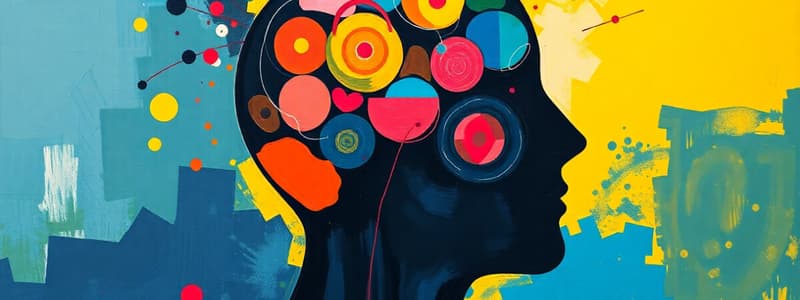Podcast
Questions and Answers
At what stage do children begin to develop their theory of mind?
At what stage do children begin to develop their theory of mind?
- Adolescence
- Late childhood
- Early childhood (correct)
- During infancy
What aspect of psychological development is described as a lifelong process?
What aspect of psychological development is described as a lifelong process?
- Physical development
- Psychological development (correct)
- Cognitive development
- Emotional development
What is the significance of developing a theory of mind?
What is the significance of developing a theory of mind?
- It leads to improved physical growth.
- It helps in recognizing and understanding one's own emotions. (correct)
- It negatively impacts social interactions.
- It is unrelated to cognitive skills.
What influences our psychological development throughout our life?
What influences our psychological development throughout our life?
Which age group is associated with the most rapid physical growth?
Which age group is associated with the most rapid physical growth?
Which of the following statements about psychological development is false?
Which of the following statements about psychological development is false?
Which skill is enhanced by a well-developed theory of mind?
Which skill is enhanced by a well-developed theory of mind?
What is expected to happen to an individual's psychological development over their lifetime?
What is expected to happen to an individual's psychological development over their lifetime?
What is the primary focus of emotional development?
What is the primary focus of emotional development?
Which aspect is NOT included in the concept of psychological development?
Which aspect is NOT included in the concept of psychological development?
Emotional development is described as a process that is:
Emotional development is described as a process that is:
Which of the following best describes emotional development?
Which of the following best describes emotional development?
Psychological development includes which processes?
Psychological development includes which processes?
What aspect of development helps individuals express emotions effectively?
What aspect of development helps individuals express emotions effectively?
The processes of psychological development are observed over which time frame?
The processes of psychological development are observed over which time frame?
Which emotion-related skill is NOT typically discussed under emotional development?
Which emotion-related skill is NOT typically discussed under emotional development?
What happens to individuals at a certain age in terms of physical growth?
What happens to individuals at a certain age in terms of physical growth?
What aspect of development continues after physical growth stops?
What aspect of development continues after physical growth stops?
Which researcher proposed categories of attachment styles between 1944 and 1988?
Which researcher proposed categories of attachment styles between 1944 and 1988?
What is the effect of different attachment styles on individuals?
What is the effect of different attachment styles on individuals?
In studying psychological development, what is often used instead of specific changes?
In studying psychological development, what is often used instead of specific changes?
What are the two main categories proposed by Bowlby focused on?
What are the two main categories proposed by Bowlby focused on?
What does psychological development encompass according to the context provided?
What does psychological development encompass according to the context provided?
What approach is taken to understand psychological development over the lifespan?
What approach is taken to understand psychological development over the lifespan?
What was the initial task presented to the students regarding the two balls of clay?
What was the initial task presented to the students regarding the two balls of clay?
Following the initial assessment of the clay, what action did the researcher take?
Following the initial assessment of the clay, what action did the researcher take?
What is one characteristic of psychological theories as described in the content?
What is one characteristic of psychological theories as described in the content?
Which of the following is NOT a type of psychological theory mentioned?
Which of the following is NOT a type of psychological theory mentioned?
After being shown the manipulated clay, what were the children asked to judge?
After being shown the manipulated clay, what were the children asked to judge?
Erik Erikson's theory of psychosocial development explains what?
Erik Erikson's theory of psychosocial development explains what?
Which of the following points reflects what children were perceiving in the study?
Which of the following points reflects what children were perceiving in the study?
What was the primary focus of the children's responses in the study?
What was the primary focus of the children's responses in the study?
What does emotional development refer to?
What does emotional development refer to?
Which aspect of development does emotional development NOT primarily focus on?
Which aspect of development does emotional development NOT primarily focus on?
How does emotional development help individuals throughout their lives?
How does emotional development help individuals throughout their lives?
What are temporary feelings referred to in the context of emotional development?
What are temporary feelings referred to in the context of emotional development?
What is a key characteristic of emotional development over the lifespan?
What is a key characteristic of emotional development over the lifespan?
What role does emotional development play in social interactions?
What role does emotional development play in social interactions?
What does the term 'psychological development' encompass?
What does the term 'psychological development' encompass?
Which of the following is NOT a focus of emotional development?
Which of the following is NOT a focus of emotional development?
What was the purpose of asking students to judge if there was the same amount of clay in each ball after observing activities?
What was the purpose of asking students to judge if there was the same amount of clay in each ball after observing activities?
Which statement best describes psychological development according to the provided content?
Which statement best describes psychological development according to the provided content?
What kind of theories are mentioned in the context of explaining psychological processes?
What kind of theories are mentioned in the context of explaining psychological processes?
What technique did the researcher use with the clay balls to test the students' understanding?
What technique did the researcher use with the clay balls to test the students' understanding?
Which of the following represents a common misconception regarding psychological phenomena?
Which of the following represents a common misconception regarding psychological phenomena?
What process did Mayer (1990) suggest in explaining certain psychological phenomena?
What process did Mayer (1990) suggest in explaining certain psychological phenomena?
Which of the following best describes 'random guesses' in the context of psychological explanations?
Which of the following best describes 'random guesses' in the context of psychological explanations?
How can psychological development be understood through the activities described?
How can psychological development be understood through the activities described?
Flashcards
Psychological Development
Psychological Development
The continuous process of emotional, cognitive, and social growth throughout life.
Emotional Development
Emotional Development
The growth of skills to control, express, and understand emotions.
Cognitive Development
Cognitive Development
The process of mental growth in learning and thinking.
Social Development
Social Development
Signup and view all the flashcards
Life Span
Life Span
Signup and view all the flashcards
Emotional Regulation
Emotional Regulation
Signup and view all the flashcards
Development Skills
Development Skills
Signup and view all the flashcards
Theory of Development
Theory of Development
Signup and view all the flashcards
Psychological Development
Psychological Development
Signup and view all the flashcards
Cognitive Development
Cognitive Development
Signup and view all the flashcards
Theory of Mind
Theory of Mind
Signup and view all the flashcards
Lifelong Process
Lifelong Process
Signup and view all the flashcards
Childhood Development
Childhood Development
Signup and view all the flashcards
Physical Growth Ending
Physical Growth Ending
Signup and view all the flashcards
Emotional Awareness
Emotional Awareness
Signup and view all the flashcards
Personal Growth
Personal Growth
Signup and view all the flashcards
Psychological Development
Psychological Development
Signup and view all the flashcards
Attachment Styles
Attachment Styles
Signup and view all the flashcards
Life-Span Development
Life-Span Development
Signup and view all the flashcards
Bowlby's Theory
Bowlby's Theory
Signup and view all the flashcards
Emotional Development
Emotional Development
Signup and view all the flashcards
Cognitive Development
Cognitive Development
Signup and view all the flashcards
Development Stages
Development Stages
Signup and view all the flashcards
Attachment Style Outcomes
Attachment Style Outcomes
Signup and view all the flashcards
Conservation Task
Conservation Task
Signup and view all the flashcards
Psychological Theories
Psychological Theories
Signup and view all the flashcards
Scientific Explanations
Scientific Explanations
Signup and view all the flashcards
Non-Scientific Explanations
Non-Scientific Explanations
Signup and view all the flashcards
Conservation in Children
Conservation in Children
Signup and view all the flashcards
Erik Erikson's Theory
Erik Erikson's Theory
Signup and view all the flashcards
Research Method
Research Method
Signup and view all the flashcards
Developmental Processes
Developmental Processes
Signup and view all the flashcards
Emotional Development
Emotional Development
Signup and view all the flashcards
Psychological Development
Psychological Development
Signup and view all the flashcards
Lifespan Development
Lifespan Development
Signup and view all the flashcards
2C Psychological Development
2C Psychological Development
Signup and view all the flashcards
Explore Box 2A
Explore Box 2A
Signup and view all the flashcards
Temporary Feelings
Temporary Feelings
Signup and view all the flashcards
2C Psychological development
2C Psychological development
Signup and view all the flashcards
2A development
2A development
Signup and view all the flashcards
Scientific Explanations
Scientific Explanations
Signup and view all the flashcards
Psychological Processes
Psychological Processes
Signup and view all the flashcards
Lifespan Development
Lifespan Development
Signup and view all the flashcards
Unscientific Ideas
Unscientific Ideas
Signup and view all the flashcards
Clay Experiment
Clay Experiment
Signup and view all the flashcards
Researcher Activity
Researcher Activity
Signup and view all the flashcards
Developmental Theories
Developmental Theories
Signup and view all the flashcards
Child Development
Child Development
Signup and view all the flashcards
Study Notes
Psychological Development Theories
- Psychological development is a lifelong process, personal to each individual, and influences how we experience the world.
- Emotional development involves lifelong skills in controlling, expressing, and recognizing emotions appropriately.
Cognitive Development
- Cognitive development encompasses skills in theory of mind (understanding others feelings and emotions).
- Theory of mind development allows individuals to understand themselves and others' emotional experiences.
Emotional Development and Attachment Styles
- Bowlby's theory identifies two main attachment styles impacting emotional development.
- These styles lead to different outcomes in subsequent emotional development.
Cognitive Development Example (Piaget):
- Piaget's theory, exemplified in a study on conservation, demonstrates cognitive development changes.
- In this study, children incorrectly perceive changing shapes to indicate a change in quantity.
Types of Psychological Theories
- Psychological theories are scientific explanations for phenomena.
- They can be evidence-based or not necessarily supported by scientific evidence.
Studying That Suits You
Use AI to generate personalized quizzes and flashcards to suit your learning preferences.




